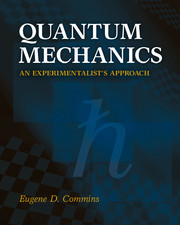Book contents
Summary
Statement of the rules
When the rules of quantum mechanics were formulated, they expressed a revolutionary break with the past. Because they were something totally new, they could not be derived from the old principles of classical theoretical physics, which, as we saw in Chapter 1, gave no predictions or erroneous predictions for many experimental results. Instead, the rules of quantum mechanics had to be obtained by intuition and inspiration from experimental results.
The first fundamental concept we encounter in formulating the rules is that of a dynamical system. As in classical physics, this usually means an isolated system such as a free electron, free neutron, free molecule, and so on. However, if we assume that quantum mechanics has general validity, it also must apply to macroscopic systems containing vast numbers of particles, and as a practical matter, it is impossible to isolate a macroscopic system from environmental influences, except in very special circumstances.
Information
- Type
- Chapter
- Information
- Quantum Mechanics , pp. 28 - 54Publisher: Cambridge University PressPrint publication year: 2014
